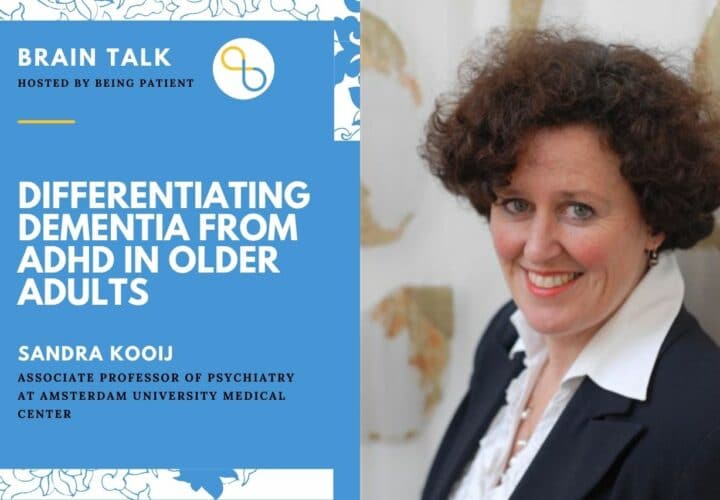As part of our BrainTalk series, Being Patient spoke with Sandra Kooij about the symptoms and treatment options of ADHD for older adults and how manifestations of the disorder resemble or differ from dementia.
Trouble following daily routines, difficulty managing finances and memory lapses — for older adults, many symptoms of ADHD (attention deficit hyperactivity disorder) overlap with signs of aging or dementia. ADHD, however, is often overlooked in older adults. For one, mild cognitive impairment or dementia are likely top of mind for clinicians and patients. And, patients may have gone undiagnosed in childhood as ADHD has only become better known in recent decades.
Being Patient spoke with Sandra Kooij, associate professor of psychiatry at Amsterdam University Medical Center about research developments in treating and diagnosing ADHD in older adults and how clinicians differentiate its symptoms from dementia.
- While the symptoms of age-related cognitive decline or dementia occurs later in life, ADHD is a childhood disorder that persists into adulthood and old age.
- The symptoms of ADHD can fluctuate depending on people’s life circumstances. Retirement and the loss of a loved one, for instance, could cause symptoms to flare as people lose their routines and structure in life.
- Experts say that stimulant drugs for children and adolescents with ADHD are effective for older adults as well. They generally need lower dosages, and doctors must also consider cardiac risks of the medications such as increased heart rate and blood pressure.
Being Patient: What do we know about ADHD in older adults?
Sandra Kooij: ADHD was historically a childhood-onset disorder. We know it from boys that cannot sit still, that are talkative, hyperactive, impulsive, inattentive at school, and have difficulty finishing school and maybe homework, and may have mood swings and anger outbursts. Nowadays, we know that it’s not only prevalent in boys, but also in girls. And we learned that it’s not outgrown in adulthood.
My specialism is on ADHD in adulthood and I started 25 years ago to find out about symptoms, impairment, comorbidities, treatment, and I did my PhD on adult ADHD in the Netherlands. But I realized that ADHD may not be outgrown after age 18, [or even later]. Let’s say at age 65, what happens to people with lifetime ADHD? Is it childhood-onset? Are they outgrowing ADHD by then? This didn’t really make sense to me and I already had seen a lot of people older than 65 with similar symptoms as their children and grandchildren because ADHD is a heritable condition in many families, not always.
Those older people came to me asking, ‘Is there still hope for me? I would like to sit still and concentrate for the first time in my life, and I see that my children and grandchildren can do that with the proper medical treatment.’
That always touches me when people really have been neglected all their lives with a condition that we now think is very well treatable and worthwhile treating because treatment reduces symptoms and impairment.
Then there is the question about how prevalent ADHD in older people is. We studied that in the Netherlands – the LASA study (Longitudinal Aging Study Amsterdam) – and found that around three percent of the population in this study still fulfilled criteria for ADHD, strict criteria. That means six of my symptoms in childhood still [persists] and impairment [is present]. We know with age, the number of symptoms may be a little bit lower, but still people may be impaired. This combination makes a diagnosis. You need to understand that the prevalence in children and adults is around three to five percent as well, so it’s not very different.
Being Patient: How do clinicians diagnose ADHD in older adults and differentiate symptoms of dementia from those of ADHD?
Sandra Kooij: The diagnosis is always made based on a clinical interview talking to the patient about lifetime symptoms and impairments, and with the family to add useful information about severity, symptoms and the onset of symptoms, because the memory of patients is usually not too good. If your attention is low, it’s also implicating memory problems from childhood on.
Usually, people ask for assessment for cognitive decline when they perceive that their memory is going down or less well than it was previously. But in ADHD people, this has been there all their life but may increase with aging and/or cognitive decline.
So it’s complex. The main difference is that patients should be able to tell you as a doctor, whether they have had attention and memory problems all their lives that led to impairment at school for instance, or under achievement at work, and all kinds of other difficulties. Then you have a lifetime course of inattention and memory problems and that’s definitely not dementia. That’s definitely ADHD.
ADHD is early-onset and has a chronic course and it’s not going away. But dementia and cognitive decline is typically starting later, maybe as early as 45 if you have bad luck. This information is crucial to differentiate both conditions.
I have to say, recent studies show that people with ADHD history may have an increased risk for dementia. There are a few studies only, but it’s very important for the world to know because doctors need to differentiate both conditions.
Being Patient: How can symptoms of ADHD flare up at different points in life?
Sandra Kooij: Usually there is a disbalance in factors. For instance, if your partner dies, and you have to deal with the loss but also with daily life, suddenly you feel that there’s something missing. It’s also the daily structure and it’s implicated in how you spend your time, what you spend with money, whether you develop debts, or whether you have difficulties due to the symptoms. It’s possible that ADHD suddenly emerges, at least it’s not coming for the first time in your life, but you’re more aware of it because your external compensation from the partner has gone, and then you suddenly are no longer in balance.
Same is true for women during menopause. This is one of my favorite subjects to study further, because in menopause, your estrogen levels drop. Estrogen is a hormone that enhances dopamine, and dopamine is the neurotransmitter involved in ADHD. When both [levels of estrogen and dopamine] go down, then you really get severe problems. This is the reason that many women during perimenopause suddenly decompensate, although they may have been able to cope before and have never been diagnosed.
Being Patient: How is dopamine involved brain function and ADHD?
Sandra Kooij: Dopamine is involved in alertness. It’s a waking agent. It’s a daytime hormone. It helps you to make decisions. It helps you to see things in perspective. These are higher cognitive functions that are very important to all of us. People with ADHD we think have too low levels of dopamine in the brain. There are many, many studies pointing in this direction, although we cannot measure it directly in the brain of course. Dopaminergic agents that increase the level of dopamine in the brain, such as stimulants, are very effective.
Being Patient: What are the treatments available for older adults with ADHD?
Sandra Kooij: We’ve studied that in the literature. We found that there were only case studies on small groups of older people being treated with stimulant medication for ADHD that we also use in younger people, and [treatment] did seem effective. The next step we did was starting a protocol for assessment and treatment of people above 55, including cardiovascular assessment before starting the medication and monitoring those during treatment. We did this in a naturalistic follow-up study, so it was not a randomized control trial and we published this last year.
We found that 113 patients that we were able to get data from the electronic files, 62 percent responded favorably and they have similar side effects and issues as younger adults. It was very much reassuring that when you take into account hypertension and other cardiovascular issues that older people have more often than younger people, it seems safe and responsible to treat them, probably with a bit lower dosages. Of course this is not the final conclusion as we need randomized control trials of older people to be sure.
Being Patient: Do people have to take ADHD medications for the rest of their lives?
Sandra Kooij: People always ask, ‘How long do I have to take this?’ And I always answer that, ‘First, give it a try and see whether it helps you at all and whether you can endure the side effects and what we have to do about the dose or the timing and eventually about other conditions that accompany ADHD. Often, conditions like mood disorders, anxiety, addiction, sleep problems are highly prevalent.’
When the patient feels better and he appreciates the effects on his functioning, then he’s motivated to take it because when he stops, symptoms return immediately in a few hours.
It’s not nice to tell people, ‘You need to take this during your lifetime.’ Nobody likes it. But if it helps you, and it prevents misery and impairment and debt and divorce and whatever, and you are able to do what you really want in life, then you don’t want to stop.
But of course, there are acceptance issues, ‘Do I really have a chronic condition? Can I really [not] do it by myself?’ These issues are frequent and we have to help people to consider their options and also to accept themselves as they are.
The interview has been edited for length and clarity.
Contact Nicholas Chan at nicholas@beingpatient.com




I am 77 and believe, a lifetime ADHD suferer. My IQ is 125 and I have had a series of good jobs in administration, In travel and and finance, 21 college credits (from 3 schools). Never diagnosed, 12 years in therapy.
Recently, my primary physician noted my yearly dementia test, taken about 2 months apart, dropped 3 points, from 28 to 25. I was asked if I would be interested in a series of tests to determine if I have ADD, dementia, Alheizmers or any ailment on that branch of ailments, as early diagnosis gives better outcomes for remaining life.
This article is important to me and my daughter, who is mildly obsessed with the next step in my “care”.